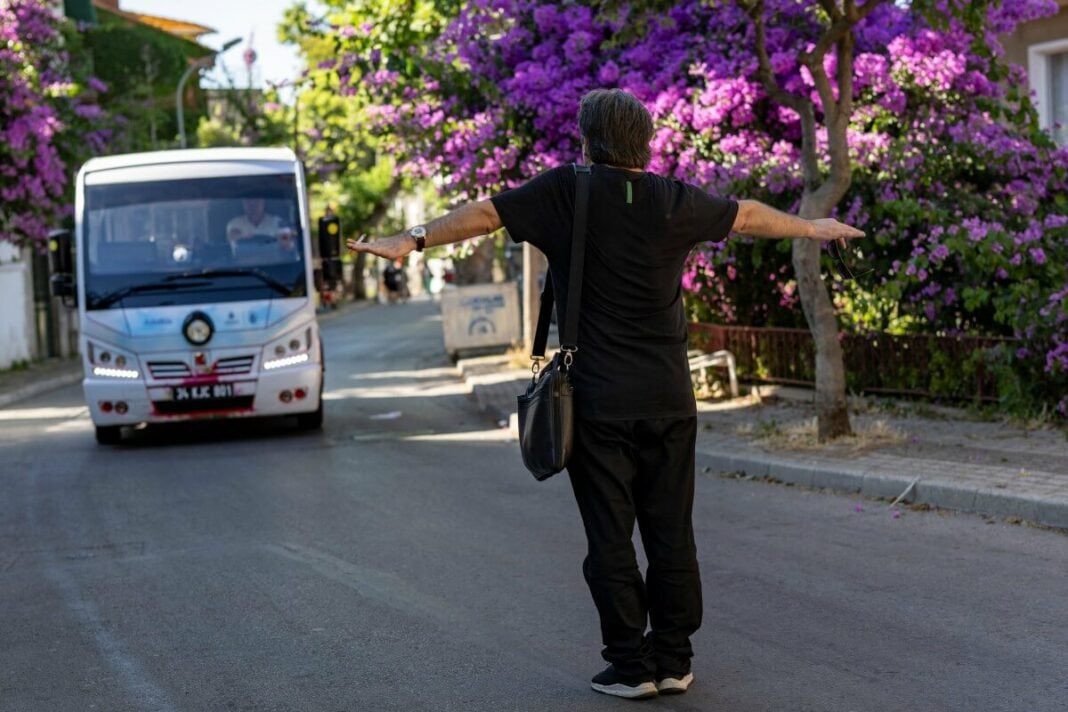İbrahim Aycan has been waging all-out war against the electric minibuses newly introduced on the car-free island of Büyükada, which he says threaten his corner of paradise on the southern shores of İstanbul.
“We live a peaceful life here,” said Aycan, a lawyer and head of the Association of Friends of the Island.
“These vehicles make us sad. People should be able to walk and cycle!”
Büyükada is one of the Princes’ Islands, a popular destination for tourists and a retreat for many of İstanbul’s 16 million inhabitants.
Motor vehicles are prohibited on the islands, except for essential services, and even horse-drawn carriages were banned in 2020 to protect the local wildlife.
But the controversial new minibuses, with a capacity of 12 people, went into service on June 15, driving through the narrow alleys of the islands.
As one of the protest leaders against the new mode of transport, Aycan uses his body as a roadblock whenever he comes across one of these “monstrobuses” — a name given by islanders in Büyükada — the largest of the Princes’ Islands, in the Sea of Marmara.
“I saw a bus on the way to my home yesterday. I had an appointment, but I stood in front of it for half an hour,” Aycan said.
Losing identity
Eight protesters were detained on the first day, and locals have staged demonstrations daily and spontaneously since.
Kamer Alyanakyan, 58, has spent every summer on Büyükada since his childhood, which is home to white wooden villas with gardens filled with colorful Bougainvillea plants.
“Nobody asked our opinion. The island’s streets are pedestrian, and we don’t want to lose that identity,” said Alyanakyan.
He has been knocking on doors to persuade residents to sign a petition calling for the removal of the minibuses.
Mehmet Can, whose cafe is a 40-minute walk from the pier, admits the new buses could have been “smaller” but he says they are “more comfortable.”
Above all, he sees them as “necessary in summer” because tens of thousands of people flock to the islands daily.
“[Authorities] will not get rid of them just because a bunch of people are complaining,” he said.
Resisting ‘pressure’
The İstanbul Municipality, run by the main opposition Republican People’s Party (CHP), has defended the minibuses and said that public transport is “necessary for the island’s residents,” especially the elderly.
It also argued that these minibuses are accessible to people with disabilities, unlike the existing small electric shuttle service.
İstanbul’s city council, which is in talks with the municipality, has opposed the minibuses.
“We support the islanders who want to defend their pedestrian streets,” the council said.
In the 1930s, cars were banned on the islands, and since 1984 it has been a pedestrian zone and a protected area.
Alyanakyan is convinced the municipality will eventually back down.
The activist will join a festival in July on Mackinac Island near Detroit — America’s car capital — which is known for its car-free roads.
“I’m going to talk to people, to the authorities over there,” he said.
“I will ask them, ‘How did you manage to resist the pressure?'”
© Agence France-Presse
